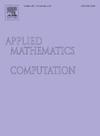Robust parameter estimation for rational ordinary differential equations
IF 3.4
2区 数学
Q1 MATHEMATICS, APPLIED
引用次数: 0
Abstract
We present a new approach for estimating parameters in rational ODE models from given (measured) time series data. In typical existing approaches, an initial guess for the parameter values is made from a given search interval. Then, in a loop, the corresponding outputs are computed by solving the ODE numerically, followed by computing the error from the given time series data. If the error is small, the loop terminates and the parameter values are returned. Otherwise, heuristics/theories are used to possibly improve the guess and continue the loop. These approaches tend to be non-robust in the sense that their accuracy often depends on the search interval and the true parameter values; furthermore, they cannot handle cases where the parameters are only locally identifiable.
In this paper, we propose a new approach, which does not suffer from the above non-robustness. In particular, it does not require making good initial guesses for the parameter values or specifying search intervals. Instead, it uses differential algebra, rational function interpolation of the data, and multivariate polynomial system solving. We also compare the performance of the resulting software with several other estimation software packages.
有理常微分方程的鲁棒参数估计
我们提出了一种从给定(测量)时间序列数据估计理性ODE模型参数的新方法。在典型的现有方法中,对参数值的初始猜测是根据给定的搜索间隔进行的。然后,在循环中,通过数值求解ODE来计算相应的输出,然后计算给定时间序列数据的误差。如果错误很小,则循环终止并返回参数值。否则,将使用启发式/理论来改进猜测并继续循环。这些方法往往是非鲁棒性的,因为它们的准确性往往取决于搜索间隔和真实参数值;此外,它们不能处理参数只能在本地识别的情况。在本文中,我们提出了一种新的方法,它不受上述非鲁棒性的影响。特别是,它不需要对参数值进行良好的初始猜测或指定搜索间隔。相反,它使用微分代数、有理函数插值数据和多元多项式系统求解。我们还将结果软件的性能与其他几个评估软件包进行了比较。
本文章由计算机程序翻译,如有差异,请以英文原文为准。
求助全文
约1分钟内获得全文
求助全文
来源期刊
CiteScore
7.90
自引率
10.00%
发文量
755
审稿时长
36 days
期刊介绍:
Applied Mathematics and Computation addresses work at the interface between applied mathematics, numerical computation, and applications of systems – oriented ideas to the physical, biological, social, and behavioral sciences, and emphasizes papers of a computational nature focusing on new algorithms, their analysis and numerical results.
In addition to presenting research papers, Applied Mathematics and Computation publishes review articles and single–topics issues.

 求助内容:
求助内容: 应助结果提醒方式:
应助结果提醒方式:


